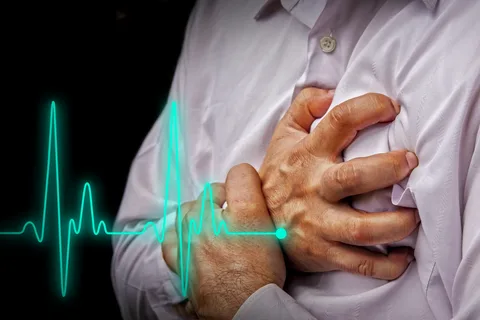Understanding Heart Rate: The Basics
The heart, that vital organ responsible for pumping blood throughout the body, beats at a certain rate, commonly referred to as the heart rate. This rate can vary depending on numerous factors, including physical activity, stress levels, and overall health. Typically, a resting heart rate for adults falls between 60 to 100 beats per minute (bpm), but individual variations exist. Understanding what causes fluctuations in heart rate is crucial for maintaining good Heart Racing.
What Constitutes a High Heart Rate?
A high heart rate, medically known as tachycardia, occurs when the heart beats faster than normal while at rest or during physical activity. Though the definition of heart rate can vary depending on age and fitness level, generally, a resting heart rate above 100 bpm is considered elevated. However, factors such as age, fitness level, and overall health must be taken into account when assessing whether a heart rate is too high.

Common Causes of Heart Rate
1. Physical Activity and Exercise
Engaging in physical activity naturally increases heart rate as the body requires more oxygen and nutrients to fuel the muscles. Activities such as running, cycling, or even brisk walking can temporarily raise heart rate. However, with regular exercise, the heart becomes more efficient, resulting in a lower resting heart rate over time.
2. Stress and Anxiety
Emotional stress and anxiety can trigger the body’s “fight or flight” response, leading to an increase in heart rate. This physiological response prepares the body to deal with perceived threats by increasing blood flow to muscles and sharpening focus. Chronic stress and anxiety can lead to prolonged periods of elevated heart rate, which may have negative implications for cardiovascular health if not managed effectively.
3. Caffeine and Stimulants
Consuming caffeinated beverages such as coffee, tea, or energy drinks can temporarily elevate heart rate due to the stimulant effects of caffeine. While moderate consumption may not pose significant risks for most individuals, excessive intake or sensitivity to caffeine can lead to palpitations and increased heart rate.
4. Dehydration
Inadequate fluid intake can lead to dehydration, which in turn can affect heart function. Dehydration reduces blood volume, making it harder for the heart to pump blood efficiently, resulting in an elevated heart rate. Staying properly hydrated is essential for maintaining optimal cardiovascular health and preventing spikes in heart rate.

5. Medications and Supplements
Certain medications and supplements may have side effects that include increased heart rate. Examples include decongestants, asthma medications, and some weight loss supplements. It’s essential to read labels carefully and consult with a healthcare professional if experiencing any adverse effects on heart rate from medications or supplements.
6. Medical Conditions
Underlying medical conditions can also contribute to heart rate. Conditions such as thyroid disorders, heart disease, anemia, and arrhythmias may cause persistent elevation in heart rate and require medical intervention. It’s crucial to monitor changes in heart rate and seek medical attention if experiencing unexplained or concerning symptoms. Explore More About (Vanish Kidney Stones Naturally)
Managing High Heart Rate
1. Regular Exercise
Engaging in regular physical activity is key to maintaining a healthy heart rate and overall cardiovascular health. Aim for at least 150 minutes of moderate-intensity exercise per week, as recommended by health experts. Incorporating activities such as walking, swimming, or cycling can help improve heart function and lower resting heart rate over time.
2. Stress Management Techniques
Practicing stress management techniques such as deep breathing, meditation, yoga, or progressive muscle relaxation can help reduce stress and anxiety levels, thereby lowering heart rate. Finding healthy outlets for stress and prioritizing self-care are essential components of managing heart rate.
3. Hydration
Maintaining adequate hydration is crucial for supporting optimal heart function and preventing dehydration-related increases in heart rate. Aim to drink plenty of water throughout the day, especially during periods of physical activity or hot weather.
4. Limiting Caffeine and Stimulants
Moderating consumption of caffeinated beverages and stimulants can help prevent spikes in heart rate and promote better cardiovascular health. Be mindful of caffeine intake from sources such as coffee, tea, soda, and energy drinks, especially later in the day.
5. Medical Evaluation
If experiencing persistent heart rate or symptoms such as chest pain, dizziness, or shortness of breath, it’s essential to seek medical evaluation. A healthcare professional can conduct a thorough assessment, including medical history, physical examination, and diagnostic tests if necessary, to identify underlying causes and develop an appropriate treatment plan.
Causes of High Heart Rate
| Cause | Description |
|---|---|
| Physical Activity and Exercise | Engaging in physical activity increases heart rate temporarily. Regular exercise leads to a lower resting heart rate. |
| Stress and Anxiety | Emotional stress triggers the body’s “fight or flight” response, raising heart rate. Chronic stress can lead to sustained elevation. |
| Caffeine and Stimulants | Consumption of caffeinated beverages can temporarily elevate heart rate due to stimulant effects. Excessive intake can cause palpitations. |
| Dehydration | Inadequate fluid intake reduces blood volume, making it harder for the heart to pump efficiently, leading to elevated heart rate. |
| Medications and Supplements | Certain medications and supplements may have side effects, including increased heart rate. |
| Medical Conditions | Underlying medical conditions such as thyroid disorders, heart disease, and arrhythmias can contribute to heart rate. |
Conclusion
While occasional fluctuations in heart rate are normal and often benign, persistent heart rate warrants attention and may indicate underlying issues that require medical evaluation. By understanding the potential causes and implementing lifestyle modifications to promote heart health, individuals can effectively manage heart rate and reduce the risk of associated complications. Prioritizing regular exercise, stress management, hydration, and medical oversight are essential components of maintaining a healthy heart rate and overall cardiovascular well-being.




